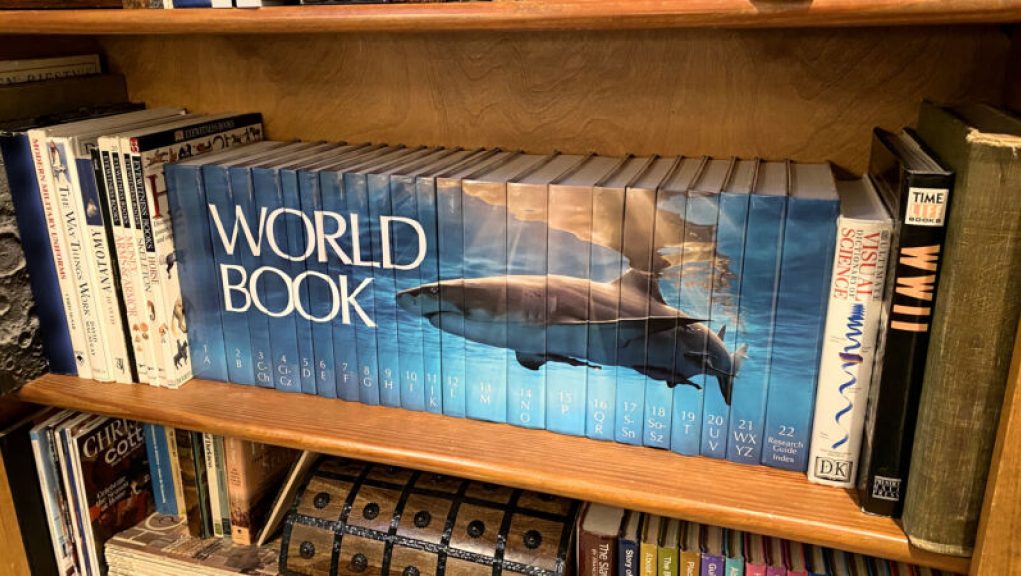In a world where machine-generated content is flooding the internet with misinformation and noise, it’s hard to know what information to trust. That’s why I was thrilled to discover that World Book still prints an up-to-date book encyclopedia in 2023. While the term “encyclopedia” may now be synonymous with Wikipedia, there’s something refreshing about having such a sizable reference printed on paper. I couldn’t resist buying one, and let me tell you why.
World Book, Inc. has been publishing encyclopedias since 1917, and they’ve released a new edition almost every year since 1925. As a subsidiary of Warren Buffett’s Berkshire Hathaway, they claim to be “the only general reference encyclopedia still published today.” And it seems they’re right, at least in English. Even The Encyclopedia Britannica, their fiercest competitor, ended its print run in 2012 after 244 years in print.
But why does the print version still exist in our digital age? According to Tom Evans, World Book’s editor-in-chief, it’s because there’s still a demand for it. While up-to-date information is readily available online, some people and organizations still prefer the reliability and accessibility of a paper encyclopedia. Sales of the print edition are “in the thousands,” and World Book always prints just enough copies to satisfy demand.
Public and school libraries are still the company’s primary customers, and they have a loyal following of librarians who understand the importance of a general reference encyclopedia in print form, accessible to all.
As a kid, I relied on our family’s 1968 edition of World Book for school reports and projects all the way until my high school graduation in 1999. Even with electronic references available, instantaneous, up-to-date information didn’t seem as important back then. We were still largely operating at the speed of paper. While that concept may seem foreign to us now, there was a certain kind of comfort in that slowness.
And speaking of slow, a paper encyclopedia set certainly can’t run away from you. The new print edition of World Book is a physically hefty reference, spanning 17,000 articles spread over 14,000 pages in 22 volumes. It features over 25,000 photographs, illustrations, diagrams, and maps. It’s a beautiful and impressive collection, but it doesn’t come cheap. The retail price for the 2023 edition is $1,199, although you might occasionally find it for as low as $799 on Amazon. The online subscription costs $250 per year.
I know it may seem strange to prefer the print edition when you can get the same content in a space-saving and portable format online. But with the paper version, the World Book will always be yours. It can’t be edited stealthily or taken down if the company needs the server space or goes out of business. So I took the plunge and bought the print edition. And I couldn’t be happier with my decision.
Many bibliophiles mourn the death of print media, particularly physical encyclopedias. That’s why the story of one man who recently purchased the very last remaining physical encyclopedia in print has warmed the hearts of bookworms around the world.
Billed as the “last encyclopedia in print”, the 1979 edition of the ‘Encyclopedie Universelle’ by publisher Larousse, is the last of its kind. According to the seller, it had been stored in the publisher’s warehouse for 40 years. When the sale was discovered and publicized, it 2attracted the attention of a French book collector, who plucked the volume from the obscurity of the publisher’s archives.
The buyer, who is only known as “Franck” in the book world, recently purchased the book for a sum of 800 euros – appraised to be worth three times more. However, Franck was not driven by potential gain, but instead by his love for books. As he explained to the press, “I don’t regret a thing. I think it is beautiful and I perfectly know the value of this encyclopedia.”
The story of Franck’s purchase highlights the value of books, even 40 years after they are published. The attention it has received, shows just how much the readers of physical books are appreciative of the total package an encyclopedia or book provides. It also shines a light on the importance of preserving books in a physical format, as they provide so much knowledge and organizational structure that electronic versions just can’t replicate.
All in all, the last remaining encyclopedia in print has been bought by a true bibliophile, who saw the value in this unique tome. Franck plainly stated, “I don’t regret a thing.” And neither should we.




















